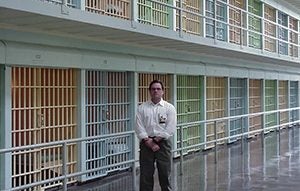 Case Western Reserve University mental health researcher Joseph Galanek spent a cumulative nine months in an Oregon maximum-security prison to learn first-hand how the prison manages inmates with mental illness.
What he found, through 430 hours of prison observations and interviews, is that inmates were treated humanely and security was better managed when cellblock officers were trained to identify symptoms of mental illness and how to respond to them.
In the 150-year-old prison, he discovered officers used their authority with flexibility and discretion within the rigid prison structure to deal with mentally ill inmates.
Galanek’s observations and interviews with 23 staff members and 20 inmates with severe mental illness, are described in the Medical Anthropology Quarterly article, “Correctional Officers and the Incarcerated Mentally Ill: Responses to Psychiatric Illness in Prison.” The National Science Foundation and the National Institute of Mental Health supported his research.
“With this research, I hope to establish that prisons, with appropriate policies and staff training, can address the mental health needs of prisoners with severe mental illness,” said Galanek, a medical anthropologist and research associate at the Jack, Joseph and Morton Mandel School of Applied Social Sciences’ Begun Center for Violence Education and Prevention Research.
“Additionally,” he said, “I show that supporting the mental health needs of inmates with severe mental illness concurrently supports the safety and security of prisons, and that these two missions are not mutually exclusive. With the number of prisoners with severe mental illness in prison increasing, efforts need to be made by all prison staff to ensure that this segment of the prison population has appropriate mental health care and safety.”
Galanek saw how administrative policies and cultural values at the prison allowed positive relationships to develop between officers and prisoners diagnosed with severe mental illnesses, among the prison’s 2,000 inmates.
Case Western Reserve University mental health researcher Joseph Galanek spent a cumulative nine months in an Oregon maximum-security prison to learn first-hand how the prison manages inmates with mental illness.
What he found, through 430 hours of prison observations and interviews, is that inmates were treated humanely and security was better managed when cellblock officers were trained to identify symptoms of mental illness and how to respond to them.
In the 150-year-old prison, he discovered officers used their authority with flexibility and discretion within the rigid prison structure to deal with mentally ill inmates.
Galanek’s observations and interviews with 23 staff members and 20 inmates with severe mental illness, are described in the Medical Anthropology Quarterly article, “Correctional Officers and the Incarcerated Mentally Ill: Responses to Psychiatric Illness in Prison.” The National Science Foundation and the National Institute of Mental Health supported his research.
“With this research, I hope to establish that prisons, with appropriate policies and staff training, can address the mental health needs of prisoners with severe mental illness,” said Galanek, a medical anthropologist and research associate at the Jack, Joseph and Morton Mandel School of Applied Social Sciences’ Begun Center for Violence Education and Prevention Research.
“Additionally,” he said, “I show that supporting the mental health needs of inmates with severe mental illness concurrently supports the safety and security of prisons, and that these two missions are not mutually exclusive. With the number of prisoners with severe mental illness in prison increasing, efforts need to be made by all prison staff to ensure that this segment of the prison population has appropriate mental health care and safety.”
Galanek saw how administrative policies and cultural values at the prison allowed positive relationships to develop between officers and prisoners diagnosed with severe mental illnesses, among the prison’s 2,000 inmates.
 Galanek in the prison where he did his research
In this maximum-security prison, left unidentified for the study to protect the confidentiality of officers and inmates, officers received training to identify symptoms of mental illness, which, in turn, led to better security, safety and humane treatment of potentially volatile inmates. But the officers were also able to use their discretion in handling some situations.
Galanek observed, for example, the following instances where an officer’s decision—rather than rigidly enforcing prison rules—helped mentally ill inmates and maintain order within the institution:
Galanek in the prison where he did his research
In this maximum-security prison, left unidentified for the study to protect the confidentiality of officers and inmates, officers received training to identify symptoms of mental illness, which, in turn, led to better security, safety and humane treatment of potentially volatile inmates. But the officers were also able to use their discretion in handling some situations.
Galanek observed, for example, the following instances where an officer’s decision—rather than rigidly enforcing prison rules—helped mentally ill inmates and maintain order within the institution:
- Prisoners are required to work 40 hours at an assigned job. But one inmate chose to remain in his cell instead of reporting to work—a prison offense. The inmate told the officer he was experiencing auditory hallucinations. Instead of sending the prisoner to a disciplinary unit, the officer allowed the prisoner to remain in his cell until the hallucinations passed.
- A correctional officer confronted a violent prisoner, who was off his medication and began smashing a TV and mirror and threatened other prisoners. Instead of disciplinary confinement, the officer conferred with mental health workers, who sent the prisoner to the inpatient psychiatric unit to get him back on his medication.
- Prisoners aren’t allowed to loiter or talk to other inmates outside their cells. But a high-functioning inmate with a bipolar disorder worked a janitorial job that allowed him to talk to other mentally ill inmates. Through those conversations, he was able to let officers know when inmates were exhibiting symptoms of their mental illness. That information allowed the officers to quickly address potential problems and decrease security risks.

